|
|
|
Sort Order |
|
|
|
Items / Page
|
|
|
|
|
|
|
| Srl | Item |
| 1 |
ID:
107952


|
|
|
|
|
| Publication |
2011.
|
| Summary/Abstract |
As the twentieth century drew to a close, political theorists of various stripes
argued that many aspects of human existence-including not only the subconscious, but also emotions, emotional states, rhetoric, aesthetics, judgments-
play a larger role in politics than does rational argument alone. Some had
argued for the "death of Man," claiming that the human is no longer a meaningful category. In this new century, the three books under review here try to
make arguments for ways to study this displaced subject, actor, human. Each
of the three books is scholarly and erudite; each is more or less successful on
its own terms. What is their contribution to political theory?
|
|
|
|
|
|
|
|
|
|
|
|
|
|
|
|
| 2 |
ID:
089270
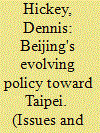

|
|
|
| 3 |
ID:
091433


|
|
|
|
|
| Publication |
2009.
|
| Summary/Abstract |
It is no exaggeration to say that sovereignty is the foundation both of International Relations (IR) as a field of enquiry and of international politics as an 'actual existing' field of practice. Whether seen as the archetypal IR101 topic or in debates about the rights and wrongs of humanitarian intervention, the capacity of international organisations to exert control over significant spheres of international politics, or in discussions about the legitimacy of bodies such as the International Criminal Court, sovereignty appears as the central referent point of international politics. Over recent years, however, there has been considerable debate over both the substantive content ('fact') and normative framing ('value') of sovereignty. The former comes about as a result of a series of political, economic and security challenges which see states as assuming a role as 'one-amongst-many' in an increasingly complex international topography; the latter stems from concerns about whether national states form the optimal site for the articulation of authority claims. This forum engages with both of these debates, focusing on how they relate to understandings of the emergence, development and possible emasculation of sovereignty in the contemporary world. In the introduction to the forum, we outline the ways in which scholars have contested the emergence of the sovereign state and examine the ethical issues surrounding the normative value of this form of rule. In the process, we lay out the ways in which the papers that make up this forum make uncomfortable, if important, contributions to the debate about the fact and value - or 'is' and 'ought' - of sovereignty in contemporary world politics.
|
|
|
|
|
|
|
|
|
|
|
|
|
|
|
|
| 4 |
ID:
077214
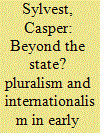

|
|
|
|
|
| Publication |
2007.
|
| Summary/Abstract |
The relationship between pluralism and internationalism is an interesting historical theme on the borderline between international relations and political theory. Intuitively the two ideologies seem to enjoy a close relationship, and at an abstract level they were both concerned with achieving political order with a minimum of central authority. However, the historical and theoretical interconnections between pluralism and (liberal) internationalism in Britain remain largely unexplored. This article attempts to fi ll this lacuna in intellectual history. Although both took shape within the confines of the same progressive intellectual agenda, the article strikes a cautious note about establishing too close a link between pluralism and internationalism, especially in the years following the Great War. This sceptical conclusion reflects not only the different preoccupations and changing nature of both pluralism and internationalism in the opening decades of the twentieth century, but also their complex theoretical relationship.
|
|
|
|
|
|
|
|
|
|
|
|
|
|
|
|
| 5 |
ID:
073757


|
|
|
| 6 |
ID:
161394
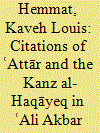

|
|
|
|
|
| Summary/Abstract |
ʿAli Akbar Khatāyi’s Khatāynāmeh (Book of China), a detailed description of state and society in Ming China written in 922/1516, includes citations from the Kanz al-Haqāyeq (attributed to Mahmud Shabestari) and ʿAttār’s Elāhināmeh. By citing these two texts at key points in his description of the Chinese government, Khatāyi articulates a radical political vision in which the civil officials, rather than the emperor, are the true rulers. Furthermore, by using the Kanz al-Haqāyeq as a portal text, and through frequent citations of other gnostic poetry, he crafts his own authorial presence by identifying his own text with fotovvat and gnosticism, and invokes a conceptual framework based on the thought of Ibn ʿArabi epitomized in his intertexts.
|
|
|
|
|
|
|
|
|
|
|
|
|
|
|
|
| 7 |
ID:
163282
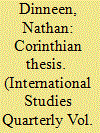

|
|
|
|
|
| Summary/Abstract |
David Hume famously argued that the idea of the balance of power existed in antiquity. However, he rests his case almost entirely on the deeds of the ancient Greeks. This evidence, by itself, only shows that balance of powers emerged as an outcome of competitive Greeks warring with each other for power and prestige. It does not demonstrate the existence of the balance of power as a social convention of the inter-polis society or as a goal of a regime's foreign policy. I argue that a focus on the speeches in the political histories of Herodotus, Thucydides, and Xenophon bears out his claim. Attention to these speeches rebuts Hume's main critics of the last century—that is, international relations scholars belonging to the English School. In particular, the speeches of the Corinthians from prior to the Persian Wars to the aftermath of the Peloponnesian War reveal an enduring thesis of their foreign policy: that imperial ambitions and leveling tendencies, such as those of Athens, Sparta, and Thebes, should be countered in order to prevent a tyrant city from emerging within the society of Greek city-states.
|
|
|
|
|
|
|
|
|
|
|
|
|
|
|
|
| 8 |
ID:
138081
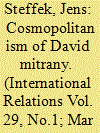

|
|
|
|
|
| Summary/Abstract |
In this article, I engage with the normative foundations of David Mitrany’s international political theory. My aim is to show that there is more to be found in Mitrany’s approach to international organization than the technocratic problem-solving often associated with his name today. To pinpoint the essence of Mitrany’s normative thought, I introduce the term ‘functional cosmopolitanism’. This variety of cosmopolitan theorizing starts from the equality of individual needs (not from rights or obligations), suggesting that transnational institutions, rather than states, should cater to these needs. An important aim of this ‘functional devolution’ is to limit and reconfigure public power, thus countering the threat of an ever more powerful nationstate. Mitrany’s proposal for introducing a functional dimension into the political system can be interpreted as a ‘thin’ cosmopolitanism, designed to free citizens from war and oppressive concentrations of political power, but vague in its ideas about individual political engagement.
|
|
|
|
|
|
|
|
|
|
|
|
|
|
|
|
| 9 |
ID:
105927


|
|
|
|
|
| Publication |
2011.
|
| Summary/Abstract |
In this article I seek to decolonise the grounding of dialogue within the Europe-modern condition. I do so by working through two authors who are indispensable to the current canon of IR theory, Immanuel Kant and Michel Foucault, and one author who is largely missing from the canon, Édouard Glissant, the Martiniquean poet and literary critique. With regards to Kant and Foucault, I show how within both there exists at the same time a strong endorsement of the policing of ethical inquiry on the grounds of the European-modern and a weaker resistance to it. With regards to Glissant, I focus on his set of essays entitled Caribbean Discourse to show how he strongly endorses a relational pluralising of the grounds of ethical inquiry while at the same time retaining a weaker accommodation to the European-modern. In the course of these discussions I present each author's assessment of an adequate ethical faculty in the form of a figure: in Kant, the enlightened philosopher; in Foucault, the creative work of art; and in Glissant, the maroon. In the final section I rehearse a dialogue amongst the three figures that opens up the grounds of ethical inquiry to decolonising impulses.
|
|
|
|
|
|
|
|
|
|
|
|
|
|
|
|
| 10 |
ID:
085339
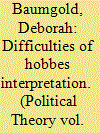

|
|
|
|
|
| Publication |
2008.
|
| Summary/Abstract |
Idiosyncrasies of Hobbes's composition process, together with a paucity of reliable autobiographical materials and the norms of seventeenth-century manuscript production, render interpretation of his political theory particularly difficult and contentious. These difficulties are surveyed here under three headings: (1) the process of "serial" composition (meaning the production of multiple, often expanded, versions of a work), which was common in the period; (2) the relationship between Hobbes's three political-theory texts- the Elements of Law, De Cive, and Leviathan, which is basic to defining the textual embodiment of his theory, and controversial; and (3) his method of writing. I argue that Hobbes's composition process undercut his intention to produce a deductive, logical theory of politics and opened the door to inconsistency and muddle in his arguments.
|
|
|
|
|
|
|
|
|
|
|
|
|
|
|
|
| 11 |
ID:
110475
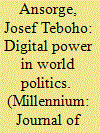

|
|
|
|
|
| Publication |
2011.
|
| Summary/Abstract |
The nature of political power has changed with the advent of modern information technology while our theories and metaphors to understand it remain wedded to earlier periods. This article begins with a discussion of some of the work done by databases in domestic and world politics. In particular, it introduces the political effects of contemporary data-management practices through short examples of terrorist information databases, the 2008 Obama campaign's database, as well as biometric databases deployed in Iraq, Afghanistan and Liberia. This leads to a consideration of the finite applicability and relevance of the widespread metaphor of the Panopticon to these kinds of cases. Given the limitations of such an image, the concept of digital power and the political metaphor of Cuntz's Tower are proposed. Digital power foregrounds the importance of machines for contemporary sovereignty while moving beyond ocular-centric notions of surveillance. Cuntz's Tower illustrates the power of identification and sorting in addition to the Panopticon's emphasis on self-discipline. This article acts as an initial ground-clearing exercise for more extensive analyses of databases in domestic and world politics.
|
|
|
|
|
|
|
|
|
|
|
|
|
|
|
|
| 12 |
ID:
117042
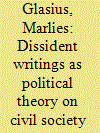

|
|
|
|
|
| Publication |
2012.
|
| Summary/Abstract |
This article offers an analysis of precisely how civil society and its relation to democracy were conceptualised by its East European and South American proponents in their pre-democratic contexts, through an examination of declarations, newspaper articles, samizdat essays, diaries, letters from prison, academic articles and prize acceptance speeches written at the time. The analysis of these source materials is organised under three main themes: the first concerns activists' understanding of the nature of the regime, its aims and its relation to society; the second relates to the features of the emergent civil society the writers of these documents desired, observed, and helped to create; and the final section discusses their strategies and aspirations in relation to 'democratisation'. On the basis of an analysis of commonalities in ideas across these two very different regional and ideological contexts, hypotheses are formulated as building blocks for a political theory of civil society under authoritarian rule, which may apply in yet other, contemporary contexts.
|
|
|
|
|
|
|
|
|
|
|
|
|
|
|
|
| 13 |
ID:
105639
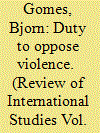

|
|
|
|
|
| Publication |
2011.
|
| Summary/Abstract |
Although the non-intervention rule is often defended as a guarantee of international order, rigid adherence to it cannot be morally justified when governments commit or permit atrocities within their territory. In such cases, intervention is permissible and may even be obligatory. Drawing on the ideas of Rousseau, Kant, and to a lesser extent Hegel, this article examines the grounds of the argument for humanitarian intervention, demonstrating that intervention is in principle not only permissible but obligatory when considered philosophically. The right to intervene can be grounded on common morality, the protection of sovereignty and the coerciveness of justice. The duty to intervene rests on a respect for humanity and the conceptual relationship between rights and duties. Considering these two lines of argument shows that humanitarian intervention can be conceived as a duty that states can be reasonably required to perform.
|
|
|
|
|
|
|
|
|
|
|
|
|
|
|
|
| 14 |
ID:
158936


|
|
|
|
|
| Summary/Abstract |
Comment on Skaria, Ajay. 2016. Unconditional Equality: Gandhi's Religion of Resistance. Minneapolis: University of Minnesota Press
|
|
|
|
|
|
|
|
|
|
|
|
|
|
|
|
| 15 |
ID:
121598


|
|
|
|
|
| Publication |
2013.
|
| Summary/Abstract |
Although pacifism and nonviolence bear a close relationship to one another historically, pacifism is the ideological assertion that war and violence should be rejected in political and personal life, whereas nonviolence refers to a distinct set of political practices. Unlike other modern ideologies such as liberalism and socialism, pacifism has never gained widespread acceptance among a significant portion of humanity and seems to remain a minority position among most of the peoples of the world. Even among those who use nonviolent techniques, the conventional wisdom that physical violence is necessary under certain circumstances often prevails. However, a growing body of empirical evidence shows that the methods of nonviolence are more likely to succeed than methods of violence across a wide variety of circumstances and that more people are using nonviolence around the world. At the same time, both the effectiveness of military and material superiority in achieving political ends and the incidence of warfare and violence appear to be waning. In a remarkable example of convergence between empirical social science and political theory, explanations for the effectiveness of nonviolence relative to violence point to a people-centered understanding of power. This research can provide a basis for a reinvigorated and pragmatic brand of pacifism that refocuses the attention of political scientists on the organization, actions, and loyalties of people as opposed to technologies of domination and destruction.
|
|
|
|
|
|
|
|
|
|
|
|
|
|
|
|
| 16 |
ID:
073754
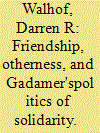

|
|
|
|
|
| Publication |
2006.
|
| Summary/Abstract |
This article makes the political dimension of Gadamer's thought more explicit by examining the interplay of three concepts in his work: solidarity, friendship, and the other. Focusing primarily on certain post-Truth and Method writings, I argue that Gadamer's conception of solidarity has to do with historically contingent manifestations of bonds that reflect a civic life together of reciprocal co-perception. These bonds go beyond conscious recognition of observable similarities and differences and emerge from encounters among those who are, and remain, in important ways other to each other. I make this case through an analysis of Gadamer's phenomenology of friendship and the crucial role of otherness in his accounts of both understanding and friendship. I suggest that Gadamer's political thought gives us a way of conceptualizing solidarity and otherness without making the other same or leaving the other completely other.
|
|
|
|
|
|
|
|
|
|
|
|
|
|
|
|
| 17 |
ID:
143839


|
|
|
|
|
| Publication |
New Delhi, Vij Books India Pvt Ltd, 2016.
|
| Description |
xxv, 351p.hbk
|
| Contents |
Vol. III: Disintegration of empires
|
| Standard Number |
9789385563171
|
|
|
|
|
|
|
|
|
|
|
|
Copies: C:1/I:0,R:0,Q:0
Circulation
| Accession# | Call# | Current Location | Status | Policy | Location |
| 058482 | 954/KAI 058482 | Main | On Shelf | General | |
|
|
|
|
| 18 |
ID:
131517
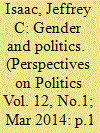

|
|
|
| 19 |
ID:
186710


|
|
|
|
|
| Summary/Abstract |
This article presents evidence for a secular increase in political engagement in political theory from 1974 to 2019 and analyzes the implications of this growth. Analysis of 385 theory articles published across three periods (i.e., 1974–1976, 2005–2007, and 2017–2019) found a near doubling in topicality among theory articles published in Polity, American Political Science Review, and Political Theory since the 1970s. This change has been substantial, statistically significant, and previously unnoted in the literature. I suggest that the shift toward topicality entails and is entailed by the production of “real events” amenable to and consistent with the theoretical approaches in which successive generations of theorists have been trained. Finally, I explain this shift toward topicality with respect to theory’s responsiveness to real events and to rising levels of professionalization within the field.
|
|
|
|
|
|
|
|
|
|
|
|
|
|
|
|
| 20 |
ID:
128928
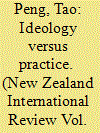

|
|
|
|
|
|
|
|